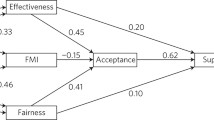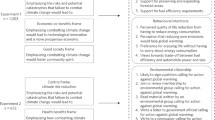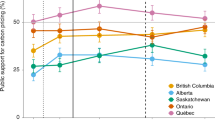Abstract
In July 2012, the Australian government instituted the Clean Energy Legislative Package. This policy, commonly known as the carbon policy or carbon tax, holds industries responsible for emissions they release through a carbon price. Because this will have an indirect effect on consumer costs, the policy also includes a compensation package for households indirectly impacted. This study, building upon past work in distributive justice, examines the determinants of the policy’s acceptance and support. We proposed perceived fairness and effectiveness of the policy, and endorsement of free-market ideology, would directly predict policy acceptance. We tested this through an on-line survey of Australian citizens and found that policy acceptance was predicted by perceived fairness and effectiveness. More Australians found the policy acceptable (43 %) than unacceptable (36 %), and many found it neither acceptable nor unacceptable (21 %). In contrast, when asked about support, more Australians tended not to support the policy (53 %) than support it (47 %). Support was predicted by main effects for perceived fairness, effectiveness, free-market ideology, and the interaction between free-market ideology and effectiveness. We conclude by considering some of the implications of our results for the implementation of policies addressing climate change mitigation and adaptation, for theories of social justice and attitudinal ambivalence, and for the continuing integration of research between economics and psychology. Furthermore, we argue for the distinction between policy support and acceptance and discourage the interchangeable use of these terms.
Similar content being viewed by others
Notes
It can be argued that studying the acceptance of a policy is more important than acceptability because of the potential consequences of non-acceptance via opposition do not exist for hypothetical policies: breaking the law, civil disobedience, or revolt. We believe, however, that both are important, and studying the acceptance of the carbon policy in Australia was, in part, a result of research timing.
See Bubna-Litic & Chalifour (2012) for their assessment of the carbon policy on Indigenous populations in Australia.
Results from our initial analysis led us to ask more questions about the differences about policy support and acceptance, therefore, later in this paper we will discuss results based on policy support.
This panel is administered by the Online Research Unit, an online fieldwork company with QSOAP “Gold Standard” and the new Global ISO 26362 standard accreditation.
Equal variances assumed for all t tests.
We thank one of our anonymous reviewers for this interesting speculation.
We note that an Australian federal election is due in September 2013. The current Labour government may lose to a conservative coalition, and the coalition has promised, as an election platform, to repeal the carbon pricing legislation.
We realize that only providing information via these proposed metrics is not an effective way to facilitate behavior change regarding policy support. However, we do believe it is an important part of the overall process.
References
Australian Bureau of Statistics. (2011). Quick Stats [Census Information]. Retrieved from http://www.abs.gov.au/websitedbs/censushome.nsf/home/quickstats?opendocument&navpos=220.
Bubna-Litic, K., & Chalifour, N. J. (2012). Are climate change policies fair to vulnerable communities? The impact of British Columbia’s carbon tax and Australia’s carbon pricing policy on indigenous communities. Dalhousie Law Journal, 35(1), 127.
Casillas, C. E., & Kammen, D. M. (2012). Quantifying the social equity of carbon mitigation strategies. Climate Policy, 12(6), 690–703. doi:10.1080/14693062.2012.669097.
Clayton, S. (2000). Models of justice in the environmental debate. Journal of Social Issues, 56(3), 459–474.
Costarelli, S., & Colloca, P. (2004). The effects of attitudinal ambivalence on pro-environmental behavioural intentions. Journal of Environmental Psychology, 24(3), 279–288. doi:10.1016/j.jenvp.2004.06.001.
De Groot, J., & Steg, L. (2006). Impact of transport pricing on quality of life, acceptability, and intentions to reduce car use: An exploratory study in five European countries. Journal of Transport Geography, 14(6), 463–470. doi:10.1016/j.jtrangeo.2006.02.011.
Dietz, T., Dan, A., & Shwom, R. (2007). Support for climate change policy: Social psychological and social structural influences. Rural Sociology, 72(2), 185–214. doi:10.1526/003601107781170026.
Eriksson, L., Garvill, J., & Nordlund, A. M. (2008). Acceptability of single and combined transport policy measures: The importance of environmental and policy specific beliefs. Transportation Research Part A: Policy and Practice, 42(8), 1117–1128. doi:10.1016/j.tra.2008.03.006.
Gärling, T., & Schuitema, G. (2007). Travel demand management targeting reduced private car use: Effectiveness, public acceptability and political feasibility. Journal of Social Issues, 63(1), 139–153.
Gehlert, T., & Nielsen, O. A. (2007). Triangulation of data sources for analysing car drivers' responses to road pricing in Copenhagen. Paper presented at the European Transport Conference, Noordwijkerhout, Netherlands.
Gross, C. (2007). Community perspectives of wind energy in Australia: The application of a justice and community fairness framework to increase social acceptance. Energy Policy, 35(5), 2727–2736. doi:10.1016/j.enpol.2006.12.013.
Hanemann, M. (1991). Willingness to pay and willingness to accept: How much can they differ? American Economic Review, 81(3), 635–647.
Heath, Y., & Gifford, R. (2006). Free-market ideology and environmental degradation: The case of belief in global climate change. Environment and Behavior, 38(1), 48–71. doi:10.1177/0013916505277998.
Jaffe, A. B., Newell, R. G., & Stavins, R. N. (2005). A tale of two market failures: Technology and environmental policy. Ecological Economics, 54, 164–174. doi:10.1016/j.ecolecon.2004.12.027.
Leiserowitz, A., Maibach, E., Roser-Renouf, C., & Hmielowski, J. D. (2012). Climate Change in the American Mind: Americans’ global warming beliefs and attitudes in March 2012. Yale University and George Mason University. New Haven, CT: Yale Project on Climate Change Communication. http://environment.yale.edu/climate/files/Climate-Beliefs-March-2012.pdf.
Lewandowsky, S., Oberauer, K., & Gignac, G. E. (2013). NASA faked the moon landing—Therefore, (climate) science is a hoax: An anatomy of the motivated rejection of science. Psychological Science, 24(5), 622–633. doi:10.1177/0956797612457686.
Schade, J., & Schlag, B. (2003). Acceptability of urban transport pricing strategies. Transportation Research Part F: Traffic Psychology and Behaviour, 6, 45–61. doi:10.1016/S1369-8478(02)00046-3.
Schuitema, G., Steg, L., & Forward, S. (2010a). Explaining differences in acceptability before and acceptance after the implementation of a congestion charge in Stockholm. Transportation Research Part A: Policy and Practice, 44(2), 99–109. doi:10.1016/j.tra.2009.11.005.
Schuitema, G., Steg, L., & Rothengatter, J. A. (2010b). The acceptability, personal outcome expectations, and expected effects of transport pricing policies. Journal of Environmental Psychology, 30(4), 587–593. doi:10.1016/j.jenvp.2010.05.002.
Seidl, R., Moser, C., Stauffacher, M., & Krütli, P. (2012). Perceived risk and benefit of nuclear waste repositories: Four opinion clusters. Risk Analysis. doi:10.1111/j.1539-6924.2012.01897.x.
Shogren, J., Seung, S., Hayes, D., & Kliebenstein, J. (1994). Resolving differences in willingness to pay and willingness. The American Economic Review, 84(1), 255–270.
Skitka, L. J., Winquist, J., & Hutchinson, S. (2003). Are outcome fairness and outcome favorability distinguishable psychological constructs? A meta-analytic review. Social Justice Research, 16(4), 309–341.
Smith, A. (1904). Of restraints upon the importation from foreign countries of such goods as can be produced at home, Chapter 2. In E. Cannan (Ed.), An inquiry into the nature and causes of the wealth of nations (Vol. 1). London: Methuen and Co., Ltd.
Steg, L., Dreijerink, L., & Abrahamse, W. (2005). Factors influencing the acceptability of energy policies: A test of VBN theory. Journal of Environmental Psychology, 25(4), 415–425. doi:10.1016/j.jenvp.2005.08.003.
Steg, L., Dreijerink, L., & Abrahamse, W. (2006). Why are energy policies acceptable and effective? Environment and Behavior, 38(1), 92–111. doi:10.1177/0013916505278519.
Stern, P. C. (2000). Toward a coherent theory of environmentally significant behavior. Journal of Social Issues, 56(3), 407–424.
Stern, P. C., Dietz, T., Abel, T., Guagnano, G. A., & Kalof, L. (1999). A value-belief-norm theory of support for social movements: The case of environmentalism. Human Ecology Review, 6(2), 81–97.
Swim, J. K., Clayton, S., Doherty, T., Gifford, R., Howard, G., Reser, J. et al. (2011). Psychology and global climate change: Addressing a multi-faceted phenomenon and set of challenges. A Report by the American Psychological Association’s Task Force on the Interface between Psychology and Global Climate Change.
Tabachnick, B. G., & Fidell, L. S. (2007). Using multivariate statistics (5th ed.). Boston: Allyn and Bacon.
Thibaut, J. W., & Walker, L. (1975). Procedural justice: A psychological analysis. New York: Lawrence Erlbaum Associates Inc.
Tyler, T. R. (2000). Social justice: Outcome and procedure. International Journal of Psychology, 35(2), 117–125. doi:10.1080/002075900399411.
Tyler, T. R., Boekmann, R. J., Smith, H. J., & Huo, Y. J. (1997). Social justice in diverse society. Boulder, CO: Westview Press.
Visschers, V. H. M., & Siegrist, M. (2012). Fair play in energy policy decisions: Procedural fairness, outcome fairness and acceptance of the decision to rebuild nuclear power plants. Energy Policy, 46, 292–300. doi:10.1016/j.enpol.2012.03.062.
Wegener, D. T., & Kelly, J. R. (2008). Social psychological dimensions of bioenergy development and public acceptance. Bioenergy Research, 1, 107–117. doi:10.1007/s12155-008-9012-z.
Wolkinger, B., Steininger, K. W., Damm, A., Schleicher, S., Tuerk, A., Grossman, W., et al. (2012). Implementing Europe’s climate targets at the regional level. Climate Policy, 12(6), 667–689. doi:10.1080/14693062.2012.669096.
Wüstenhagen, R., Wolsink, M., & Bürer, M. J. (2007). Social acceptance of renewable energy innovation: An introduction to the concept. Energy Policy, 35(5), 2683–2691. doi:10.1016/j.enpol.2006.12.001.
Acknowledgments
This research was supported by a research fellowship from the Endeavour Awards for the principal investigator and funds from the Commonwealth Scientific and Industrial Research Organization. We would like to thank Zoe Leviston, Henry Covey, and two anonymous peer reviewers for their helpful feedback.
Ethical Standards
This research has been assessed against the requirements of the National Statement as posing a low-risk to participants and has been granted ethics clearance in Australia by the Commonwealth Scientific and Industrial Research Organisation.
Conflict of interest
The authors declare that they have no conflict of interest.
Author information
Authors and Affiliations
Corresponding author
Appendix 1
Appendix 1
Thank you for participating in our survey. Please answer each statement or question as honestly as you can. There are no right or wrong answers; we are interested in your opinions.
Section 1
This section asks you to indicate how strongly you agree or disagree with the following statements.
1 | 2 | 3 | 4 | 5 | ||
|---|---|---|---|---|---|---|
Strongly Disagree | Disagree | Neutral | Agree | Strongly Agree | ||
1 | An economic system based on free-markets unrestrained by government interference automatically works best to meet human needs. | |||||
2 | I support the free-market system, but not at the expense of environmental quality. | |||||
3 | The free-market system may be efficient for resource allocation, but it is limited in its capacity to promote social justice. | |||||
4 | The preservation of the free-market system is more important than localized environmental concerns. | |||||
5 | Free and unregulated markets pose important threats to sustainable development. | |||||
6 | The free-market system is likely to promote unsustainable consumption. | |||||
7 | Individual consumers should be financially compensated to offset increased costs on goods resulting from a carbon price. | |||||
8 | Industries should be responsible for paying for the greenhouse gases that they emit, such as carbon. |
Section 2
Last July, the Australian government instituted the Clean Energy Legislative Package. The government seeks to hold about 500 big industries responsible for the emissions they release through a carbon price, which will have an indirect effect on the price paid for goods. Therefore, the government has also created a compensation package for households indirectly impacted by the carbon price. Below is a quick summary of the government’s plan, as stated by their website, Clean Energy Future. Please read this summary to help you answer the following survey questions.
“The Clean Energy Legislative Package…includes the carbon pricing mechanism and delivers support for jobs and competitiveness and Australian’s economic growth, while reducing pollution. Households will be assisted through tax reform and increased payments.”
-
The overall increase in cost of living for average Australian households due to carbon pricing is expected to be modest … less than one cent for every dollar spent.
-
Average food costs are expected to increase by less than $1 per week, the average household electricity bill is expected to increase by $3.30 per week, and the average gas bill is expected to increase by $1.50 per week.
-
Households will not face a carbon price on the fuel they use for transport.
-
Around 60 % of taxpayers will receive a tax cut of at least $300 and no private citizens will pay more tax.
-
All the funds raised from the price on carbon will be used to provide the above-mentioned tax cuts and increase benefits to households, build a new clean energy future, and support jobs in highly affected industries
(http://www.cleanenergyfuture.gov.au/clean-energy-future/our-plan/).
The following questions ask you about the current carbon policy, in general. It also asks about specific components of the policy such as carbon pricing and compensation. Please indicate your opinions on the scale.
9. How acceptable do you find the Clean Energy Legislative Package?
1 | 2 | 3 | 4 | 5 |
|---|---|---|---|---|
Completely unacceptable | Somewhat unacceptable | Neither acceptable nor not acceptable | Somewhat acceptable | Completely acceptable |
10. How fair do you think it is that some big industries now must pay for the carbon they emit, as mandated by the carbon pricing policy?
1 | 2 | 3 | 4 | 5 |
|---|---|---|---|---|
Completely unfair | Somewhat unfair | Neutral | Somewhat fair | Completely fair |
11. How effective do you think the carbon pricing policy will be to help lower carbon emissions from industries in Australia?
1 | 2 | 3 | 4 | 5 |
|---|---|---|---|---|
Completely ineffective | Somewhat ineffective | Neutral | Somewhat effective | Completely effective |
12. How fair do you think the compensation plan is for those affected by increased costs due to the carbon price?
1 | 2 | 3 | 4 | 5 |
|---|---|---|---|---|
Completely unfair | Somewhat unfair | Neutral | Somewhat fair | Completely fair |
13. How effective do you think the compensation plan is in reducing the financial impact of the carbon price on individuals?
1 | 2 | 3 | 4 | 5 |
|---|---|---|---|---|
Completely ineffective | Somewhat ineffective | Neutral | Somewhat effective | Completely effective |
14. Do you support the carbon policy (The Clean Energy Legislative Package)?
Yes
No
Rights and permissions
About this article
Cite this article
Dreyer, S.J., Walker, I. Acceptance and Support of the Australian Carbon Policy. Soc Just Res 26, 343–362 (2013). https://doi.org/10.1007/s11211-013-0191-1
Published:
Issue Date:
DOI: https://doi.org/10.1007/s11211-013-0191-1




